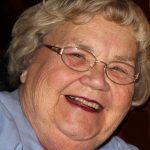By Betty Mills
My mother was 21 when she voted for the first time after the constitutional amendment granted women the same voting rights as men in this centuries old democracy of ours. The year was 1921!
In retrospect I find that startling. Granted I’m no spring chicken, but that was my mother, not my great grandmother. So I add that to my list of “Why Didn’t I?” Why didn’t I ask her how she felt that first momentous occasion? Where did she vote? Printed ballot? Did she discuss voting with anyone first?
Ah, yes, the “Why Didn’t I” list. I am reminded of the admonition of Omar Khayyam, “What boots it to repeat that time is slipping underneath our feet?” But how else are we reminded to ask the questions while there is still time?
For instance, there was my Uncle Otto, the bachelor Swedish rancher, who came to this country when he was a teenager, homesteaded near Carson, North Dakota, and raised Black Angus cattle. He lived with us one winter when I was a teenager and he was in his seventies.
Did I ask him what made him leave Sweden? Who did he leave behind? How was the boat trip over? Was he frightened when he landed in New York? Was he ever sorry he left Sweden? Why?
One of my daughters just sent a sample of my spit to one of those genealogy organizations that may eventually tell me whether I’m related to the king of Sweden, or maybe Norway. Personally I’d still like to know the answer to a question I once asked my mother: “How come every one in the family, including a lively roster of aunts and uncles, have blue eyes except for you and me?”
She rattled on about the Vikings and those French girls they probably kidnapped on one of their raids. I’ve just been reading a book, The Vikings, by Howard La Fay, and I rather hope my spit doesn’t reveal any such kinship since those bad boy Norwegians terrorized Europe for 250 years—not anyone to invite to a family reunion.
Perhaps we should all keep a “Why Didn’t I?” list handy. Not the one about cleaning the storage room, but about collecting the family lore while there are still relatives alive and thinking. For many second generation North Dakotans there are fascinating stories lurking in those hardy early immigrants, many of whom arrived with nothing much but determination to “make a go of it.”
I went to a one room rural school in western North Dakota. But even the gateposts are gone, and yellow buses pick up the rural children now and bring them into town. So what do they know of a school with no electric lights and no water?
When the school house caught on fire—easily the most exciting day of my eight year sojourn in that building—there was no rural fire department, or a telephone to call for help. And it was in mid-winter, when often the roads were hazardous.
We, the pupils, thought it was a lark. Escaping arithmetic and getting to throw snowballs inside the school? And praised for our efforts? What was the state of the teacher’s well-being during all of this? She was my cousin Ruth. I could have asked her.
Many of us have in some odd box in the attic one of those old black photograph albums filled with pictures of people in outdated outfits, in various poses, and we don’t have a clue about their identity.
Going through one such album one day I recognized my mother and my Aunt Millie, sitting on a picnic bench in a wooded area, entirely surrounded by young men in pants and vests, cigarettes in hand. Aunt Millie was still alive, so I took the picture to the nursing home where she was living.
“Tell me about this picture,” I said, and she broke into a big grin, and said gleefully, “Those were the Finn boys.” I knew my mother had taught school in a Minnesota Finnish community, so I said, “And?” She broke out an even grander grin and said, “We had such a good time!”
More details I could not elicit from her, but I left her still smiling while I had a previously unknown glimpse into my mother’s life before she met my father.
Obviously history is more than a dissertation on events in the public arena. It is also worth pursuing in our private lives. So here’s to keeping an active “Why Didn’t I” list that has to be continually revised.
Betty Mills was a Bismarck Tribune political columnist for 25 years. She
 belongs to three book clubs, and at age 90, can share a story of her own when she isn’t reading. Betty is currently writing her family’s history.
belongs to three book clubs, and at age 90, can share a story of her own when she isn’t reading. Betty is currently writing her family’s history.
